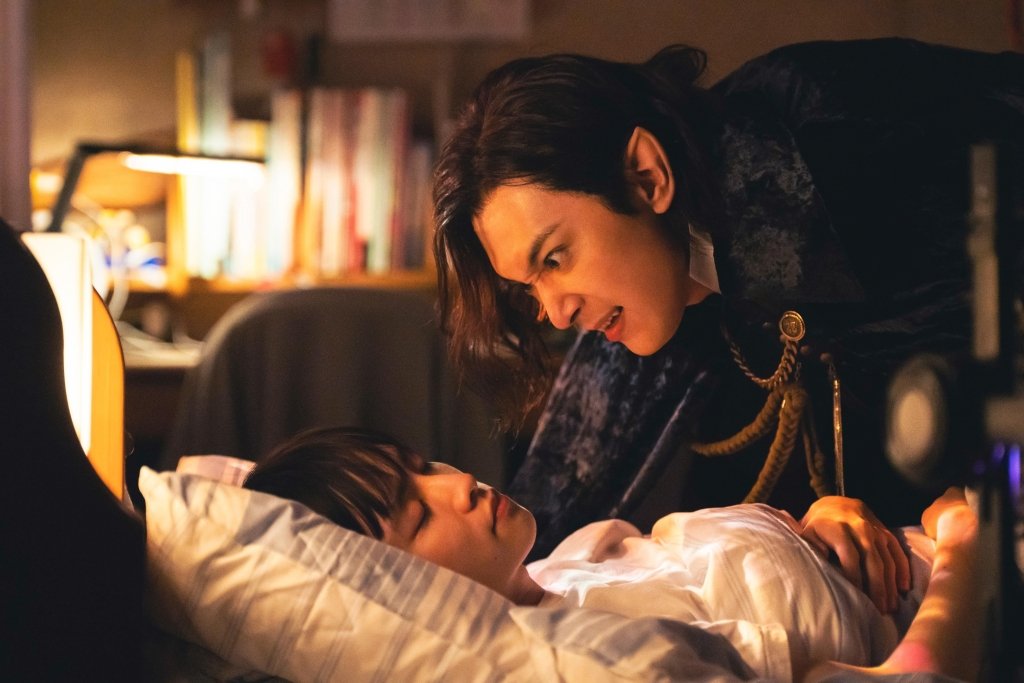Seriously wounded, Ranmaru (Yoshizawa Ryo), a 450 year old vampire, is saved by a kind child Rihito and brought to his family’s public bath. Ten years on, Ranmaru is one of the family and works and lives happily with the now teenaged Rihito (Itagaki Rihito). Ranmaru nurtures Rihito, waiting for him to turn 18 years old as that is when pure virgin blood is most delectable. Things begin to change when Rihito falls swiftly for a cute classmate Aoi (Hara Nanoka) and Ranmaru, fearing the loss of his dear Rihito’s purity, takes it upon himself to prevent them from getting too close; inadvertently earning the affections of the vampire-obsessed Aoi. Add in Aoi’s musclebound brother, a vampire hunter, and a mysterious and dangerous face from the past, and Ranmaru must decide whether to fight for his current life or return to the life of a monster.
Director Hamasaki Shinji returns to the supernatural with Babanba Banban Vampire after his somewhat uneven Not Quite Dead Yet, reteaming with Yoshizawa in this adaptation of the popular manga. Colorful and energetic, Hamasaki directs a goofy comedy that is heavily of character interactions even if character development is fairly shallow. This doesn’t necessarily detract from the film really; it’s a common side effect of bringing long form media onto the silver screen. Still, the character introductions go quite a long way in bringing the important elements of the characters to the audience quickly. Perhaps the most enjoyable parts of the films, these musical interludes marry multiple musical styles and film genres for what are essentially humorous mini movies within the film. Music superstar imase handles the theme and provides lyrics to these stellar sequences.
Yoshizawa isn’t afraid to shed his heartthrob status with his physical and outlandish portrayal. Tackling comedy along with a little action, Yoshizawa seems to have a lot of fun with the heightened comedy of this world. Itagaki plays the pure-hearted Rihito for maximum shota effect; his pouting faces, child-like mannerisms, and use of boku to really affect a cute response from the audience. It’s a fairly one not performance but I trust that the role didn’t really offer much. The extended cast generally doesn’t have the screen time to have much in the way of memorable moments outside of their introductions but Hamasaki does make the effort to land an effective joke at either their or Ranmaru’s expense. Rising starlet Hara seems like the one who suffers from this the most as this blunted corner of this film’s love triangle. EXILE Family member Sekiguchi somehow becomes baby-faced in his boisterous portrayal as Aoi’s brother and was a lot of fun for the moments he was on screen. Mitsushima surprisingly has perhaps the most developed character of the supporting cast with multiple humorous scenes with Ranmaru and the other cast. Maeda is a third act character and brings the film’s true conflict among all the silliness happening previously; it’s probably one of the main events of the manga but seems unfortunately shoehorned into the film despite the movie existing as almost like a series of jokes.
I am definitely glad that Babanba Banban Vampire has made it to screen considering all the uncertainty surrounding Yoshizawa’s unfortunate incident earlier this year. While the film doesn’t really stand out, I think beyond Yoshizawa’s eccentric performance, it’s still a fairly enjoyable comedy for those with a taste of the outlandish brand of Japanese humor.
Babanba Banban Vampire enjoyed its North American Premiere at the 24th edition of the New York Asian Film Festival.

